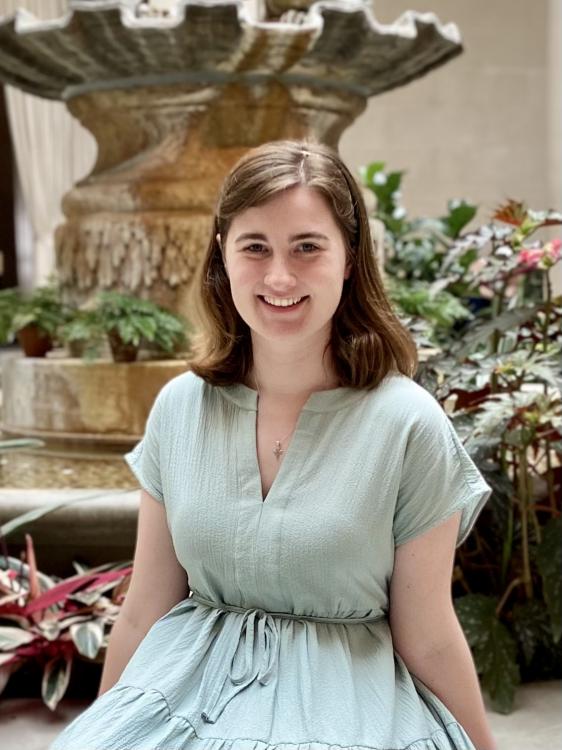
The J. Ingles / PAIDEIA Award is an award given annually in memory of Dr. James Wesley Ingles, former Professor and Chairman of the English Department at Eastern Baptist College, to the graduating senior (or seniors, in the case of a tie) in the Templeton Honors College who most embodies the values of the College: truth and learning, wisdom and virtue, stewardship and service. The recipient is selected by an anonymous vote of the Templeton faculty, staff, and graduating seniors, each person having one equal vote.
Previous Winners:
Cohort of 2017: Saraí Gonzalez
Cohort of 2016: Abigail Webb & Philip Piper
Cohort of 2015: Micah Skinner
Templeton Senior and Classics major, Ellen Francis, reflects on her time in the Honors College and the importance of "Learning in Wartime" in a speech given at the Honors College Senior Banquet, April 24, 2022.
The following passage is from Primo Levi’s memoir Survival in Auschwitz, which we read in Dr. Lee’s Western Civilization class. In this chapter, Levi and another prisoner are carrying an empty pot through the concentration camp to fetch a lunch ration for their work group. Levi is trying to recite the Canto of Ulysses from Dante’s Divine Comedy from memory.
“…The canto of Ulysses. Who knows how or why it comes into my mind. But we have no time to change, this hour is already less than an hour… Who is Dante? What is the Comedy? That curious sensation of novelty which one feels if one tries to explain briefly what is the Divine Comedy. How the Inferno is divided up, what are its punishments. Virgil is Reason, Beatrice is Theology.
Here, listen… open your ears and your mind, you have to understand, for my sake:
‘Think of your breed; for brutish ignorance
Your mettle was not made; you were made men,
To follow after knowledge and excellence.’
As if I also was hearing it for the first time: like the blast of a trumpet, like the voice of God. For a moment I forget who I am and where I am…
It is vitally necessary and urgent that he listen… before it is too late; tomorrow he or I might be dead, or we might never see each other again, I must tell him, I must explain to him about the Middle Ages, about the so human and so necessary and yet unexpected anachronism, but still more, something gigantic that I myself have only just seen, in a flash of intuition, perhaps the reason for our fate, for our being here today…”[1a]
I don’t know if you’ve watched the news, or scrolled through Twitter, or really been awake and in public recently, but you may have noticed that things in the world are not so great. Yesterday marked the second month of Russia’s invasion of Ukraine, inflation is on the rise, and we are still in the middle of a global pandemic. But fear not! On May 7, I’ll cross Eastern’s threshold and step out into the cruel world, armed with a piece of paper that says I know how to speak Latin. Gaudeamus igitur!
In “Learning in Wartime,” C.S. Lewis remarks that “Human life has always been lived on the edge of a precipice…If men had postponed the search for knowledge and beauty until they were secure, the search would have never begun.” As bad as things are now, and as bad as they were for Lewis and Primo Levi in the 1940’s, there has never been and will never be a better time to learn Latin, or read Dante, to study astronomy, or practice philosophy, or sing hymns.
Furthermore, not only will things probably not get significantly better; they might get significantly worse! Things got worse for some of our favorite characters: Socrates, Boethius, Primo Levi, of course, and others. What then? Perhaps it’s when things get even worse that our great books education becomes more necessary than ever, because it tells us that we are but passengers on a journey to our true home (eating little bags of peanuts), that we are made in the image and likeness of God, and that we must cultivate the virtue of hope.
Hope is what I’m taking with me from my time in the Honors College. Hope that “this light momentary affliction is preparing for us an eternal weight of glory beyond all comparison, as we look not to the things that are seen but to the things that are unseen. For the things that are seen are transient, but the things that are unseen are eternal.”[1] Hope that “though the last lights off the black West went/ Oh, morning at the brown brink eastward, springs.”[2] Hope that “the light shines in the darkness, and the darkness has not overcome it.”[3]
I’m grateful for the education that has given me this hope, and I’m grateful for you all, my classmates and professors. I pray that you all share this hope with me, and that we might share it with others.
[1] 2 Corinthians 4:17-18
[2] Gerard Manley Hopkins, “God’s Grandeur”
[3] John 1:5
[1a] Primo Levi, Survival in Auschwitz, chapter 11: “The Canto of Ulysses”








